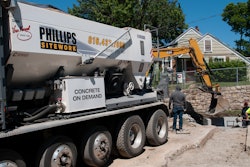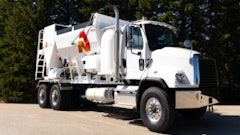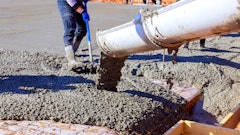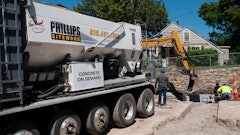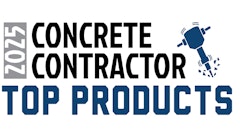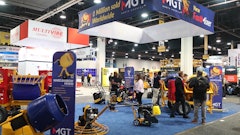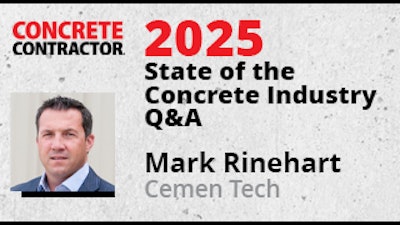
Mark Rinehart, vice president of sales and marketing at Cemen Tech, shares his insight into the state of the concrete industry and the challenges contractors are managing daily. Concrete Contractor connected with Rienhart in June 2025. Cemen Tech is a manufacturer of volumetric mix trucks.
Q. What have been the more challenging issues for concrete contractors this year? How have these challenges impacted contractors?
 Mark RinehartCemen Tech
Mark RinehartCemen Tech
The material costs are not going down, by any means, and that's the same with concrete. Concrete materials continue to go up in certain areas. In some areas, when there's no residential work, maybe the ready-mix guys have dropped their prices some, but all the input costs are still high.
I think [contractors] have got to be struggling with that, just not knowing what the economy is going to be like. There's a new headline every day about what's going on. Are we going to go into a recession? Are we not? As a manufacturer in the concrete industry, contractors have been staying on the fence, meaning they're not pulling the trigger on stuff. Most of the guys I talked to have a lot of work and have a good backlog, but they don't know what is coming next so they're a little hesitant of buying a new truck or a mixer until they are more comfortable with what the economy is going to be like.
Q. In years past, I’ve been told that contractors kept a backlog of about six months to a year. Has that changed? Are contractors playing a little bit closer to the chest?
I think it has. Before it was 8 or 9 months, I think it has lowered a lot. A lot of that revolves around residential construction being slow in a majority of the areas because usually that will tie up other contractors and ready-mix guys. When that work isn’t there, they all go looking elsewhere. Now they’re competing with more people in different jobs that you may not have battled with before. I think, ultimately, there's less work. For example, think of how many contractors are involved in a housing development. If they're not in an area where they're not building new houses, those guys have to find work somewhere, and it becomes more competitive.
The number one challenge for those I talked to is finding drivers for their concrete trucks…but that's not a “this year” problem — that's been a “last five years” type problem.
Q. What insight do you have on contractors managing skilled labor challenges?
In our case, the number one challenge for those I talked to is finding drivers for their concrete trucks. [Cemen Tech] could probably sell 100 more trucks if I had 100 people who could drive them right now to divvy up over our contractors, but that's not a “this year” problem — that's been a “last five years” type problem. The hard part right now is that I don't know where we're going to find more drivers. We're going to have to make autonomous concrete trucks or something to get over this issue.
Q. What is the industry doing to counteract the issue?
It's increasing the benefits to try and get the good employees they have to stay and not leave for an extra $0.50 to a company down the road. A number of our customers have hired ex-cons/felons out of prison who never would have been hired before, but those customers found success by giving them an opportunity. They're thankful for that opportunity. They keep the trucks clean, try to keep their head, be involved, and out of trouble.
We have other customers that will use firefighters because they have their CDL licenses. They’re off sometimes three days of the week to hire them to come in and drive.
Q. Where have we seen positive growth in the industry?
We've seen the most in infrastructure projects. Utility work, road and bridge projects, and repair projects for municipalities are the three areas where we've seen the biggest increase in business. Hopefully, it’s sustainable for the next 3 to 5 years. Municipalities seem to have money right now all across the country, so they're able to get more work done now with their budgets being stronger than they have in the past.
Q. What type of concrete work are municipalities looking at?
What we see on our side is curb/sidewalk repair work. Every city has concrete breaking every day — going out and fixing those with small batches of concrete are perfect for our customers and ready-mix too. There's always going to be work in the cities.
The road infrastructure is terrible pretty much everywhere. It feels like those patch jobs are endless right now.
Q. Is this an after-effect of the Infrastructure Bill funding?
I think a lot of it is. The municipal works fluctuated a little bit with COVID with budgets coming down but it's now back up — that work has always been there.
The infrastructure work, the bridge resurfacing, the underground water, and new water systems being put in and improved — a lot of that is from that bill.
Q. Do you think that this will track into 2026?
I think we should have a little runway with those types of projects for probably, at least, (hopefully) another 3 to 5 years.
I think it's another up-and-down part of life as a contractor. It’s never easy. It never has been easy.
Q. You mentioned earlier that contractors are bidding less far in advance than years past. How else have you seen contractors handling economic challenges?
Honestly, I think it's another up-and-down part of life as a contractor. It’s never easy. It never has been easy. You run with it when it's not, like 2 to 3 years ago, and make the best out of it. But now, it's back to being more competitive. Hopefully, next year or sooner it goes back up, and everyone starts going “full bore” again, but I think it's the life of a contractor. They have to deal with it and fight through it every day.
Q. What technological areas do you see potential for innovation? What issues do you see solutions addressing?
Anything that can give [contractors] more information to make better decisions with an AI and digitizing the jobsite/project more so they can analyze how they can cut costs and reduce labor, is going to always be important.
Construction has always been the lowest of the industries of technology. Now, with the resources available to collect the data and analyze factors like the time waiting for concrete, those solutions will help contractors make better decisions. Maybe even help them with schedules with going to one project before another.
The ability to have data to support that carnal knowledge they've always had about things should help make those decisions a little bit better.
Digitizing the construction process can always help, such as understanding material usage, what their loss is on materials, and factors that they don't think about because they're going 100 miles an hour. Having alerts and solutions that understand situations like having a forgotten piece of equipment out on rent that has been sitting in some guy's yard for 2 weeks. It’s tough to do when you have 100 pieces of equipment or 50 trucks running around.
Q. How far behind would you say the construction industry is on high-end technology?
With AI, the industry should be able to catch up.
ERPs and bidding software for contractors are starting to integrate AI into their solutions. I don’t know if it exists yet or not, but if there was a way contractors could input their information into a custom AI that could actually analyze it from a construction perspective would be “next level” for contractors, whether you’re pouring concrete or putting a building up.
What’s exciting to me is seeing all the different materials out there and how they can really benefit or potentially change the industry.
Q. What do you expect the challenges for contractors will be in 2026 and beyond?
Staying on top of what is coming. The [need of] drivers is probably always going to be a problem in the human aspect of it, but trying to find out what technology fits your business the best.
The stuff that I'm excited about is the new types of different materials coming out now that are going into concrete and how those could affect jobs, bidding on jobs, and getting different types of projects.
For example, one of our contractors in San Francisco was able to pour almost 100 yards of portland-free cement. Those type of materials, addressing them, and knowing when you should start looking into that work. From a concrete perspective, what’s exciting to me is seeing all the different materials out there and how they can really benefit or potentially change the industry.
Q. What’s going on at Cemen Tech?
We're trying to get our hands around the whole data aspect so customers can understand what our trucks are doing, where they're at, what material they're using, through our ACCU-POUR software suite.
Because we can make a short batch, we have a great technology for introducing and testing these new materials, admixtures, or chemicals. For example, we’ve been testing with a customer using graphene, and Iowa State has a project from a grad student who's putting shredded wood and other recycled materials into concrete. I'm excited to see how that plays out.
We're also working with universities to test the validation of our technology and how we mix vs. a barrel truck.
The other thing is doing larger pours with our trucks. We've always been thought of as doing the small batch jobs. We have a number of customers now that are doing 1,000 yards a day with 2 trucks. I think that's exciting from our standpoint of continuous pour projects.
Q. Any innovations out there caught your attention?
Concrete printing is super cool and continues to grow and expand. Being able to build a house with reduced labor, reduced materials, and less waste are factors that [the industry] needs to figure out because, again, we can't find people to do these sorts of jobs. Anything that we can use robotically to help, I think, is super cool. I'm excited to see how that industry continues to grow.







